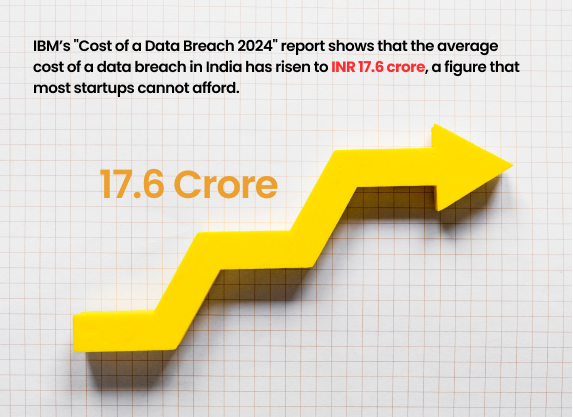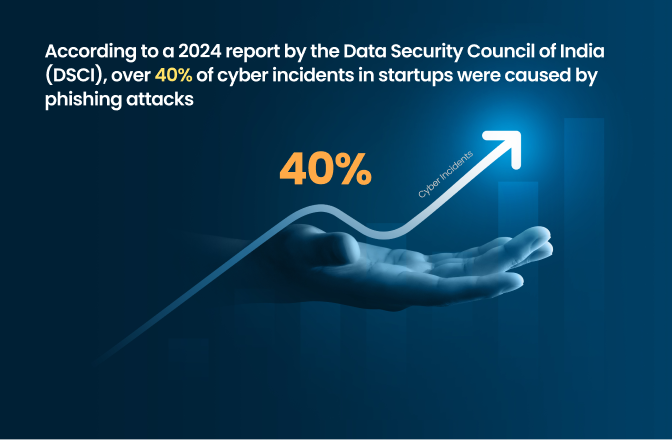“In the first half of 2024 alone, cyberattacks targeting tech startups increased by over 30%, causing millions of dollars in losses worldwide.“ — Data from the 2024 Global Cybersecurity Threat Report by Cybersecurity Ventures.
In the fast-paced world of consumer tech startups, innovation is at the forefront, driving progress and transforming industries. But with great innovation comes great risk—specifically, cyber risk. As consumer tech startups continue to rely on advanced technology, cloud infrastructure, and vast amounts of consumer data, they become attractive targets for cybercriminals.
Whether it’s ransomware attacks, data breaches, or phishing scams, cyberattacks are a growing concern for tech startups, especially those handling sensitive personal data and financial information.
To safeguard against these growing threats, cyber insurance has become an essential tool for startups to ensure they don’t face ruin after a security breach. In this article, we’ll explore why cyber insurance is a critical investment for consumer tech startups, what types of cyber threats these businesses face, and how tailored cyber insurance can help mitigate the risks.
Industry Overview: Consumer Tech Startups in India
India is home to one of the most vibrant startup ecosystems in the world, particularly in the consumer technology sector. With over 100 unicorns and countless small to mid-sized startups, the industry has become a hotbed of innovation.
Consumer tech startups in India cover a wide range of services, including fintech apps, e-commerce platforms, health tech, and educational technology. The rapid growth in the sector is attributed to India’s booming digital economy, access to a growing internet user base, and increasing investor interest.

However, as consumer tech startups grow, so does their exposure to cyber threats. The industry, valued at around USD 73 billion in 2023, is an attractive target for cybercriminals due to the massive amounts of personal and financial data stored on their platforms. A single data breach can severely impact the trust between a startup and its users, resulting in huge financial losses, damaged reputations, and potentially, the closure of the business.
Startups like Mobikwik and BigBasket have already faced major data breaches, losing sensitive data on millions of customers, and the fallout was disastrous. These incidents underscore the need for a comprehensive approach to cybersecurity, one that includes cyber insurance as a key pillar.
The Growing Importance of Cybersecurity for Consumer Tech Startups
The world is more digital than ever, and the tech startup space is no exception. Indian consumer tech startups rely heavily on data, cloud computing, and mobile technologies to operate. While this digitization has enabled businesses to scale rapidly, it has also made them prime targets for cyberattacks.
In recent years, startups have increasingly become victims of sophisticated cyber threats.
One notable incident where consumer tech startups were targeted occurred in the Kaseya ransomware attack in July 2021. This attack, attributed to the REvil ransomware group, exploited a vulnerability in Kaseya’s VSA software, which is widely used by Managed Service Providers (MSPs). The attack affected over 1,500 businesses worldwide, including several tech startups that relied on MSPs for IT management.
REvil encrypted the data of these companies and demanded ransom payments. Startups and smaller businesses were particularly vulnerable, as they often depend on MSPs for their security and infrastructure. This attack caused widespread disruption in services and business operations, affecting a broad range of industries, including consumer tech (GuidePoint Security).
While the primary attack vector was through Kaseya, many consumer tech startups relying on MSPs were indirectly hit, demonstrating the growing trend of supply chain attacks targeting smaller tech companies through third-party service providers.

Why are startups particularly vulnerable?
Unlike large corporations with extensive cybersecurity resources, many consumer tech startups operate with limited IT budgets and lack comprehensive cybersecurity strategies. This makes them easier targets for hackers. Moreover, startups tend to store a large volume of sensitive customer data, including credit card details, personal information, and behavioral analytics—an attractive prize for cybercriminals.
Data breaches, ransomware, and phishing attacks are some of the most common types of cyber threats faced by tech startups. In fact, a 2024 report by the National Cyber Security Centre (NCSC) found that startups were three times more likely to experience a data breach than larger enterprises. And these breaches are costly.

IBM’s “Cost of a Data Breach 2024” report shows that the average cost of a data breach in India has risen to INR 17.6 crore, a figure that most startups cannot afford.
Why Cyber Insurance is Critical for Consumer Tech Startups
Cyber insurance is no longer a luxury—it’s a necessity for consumer tech startups operating in today’s high-risk environment. While cybersecurity measures like firewalls, encryption, and regular software updates are crucial, they aren’t foolproof. Hackers are becoming more sophisticated, and the risk of a breach is always present. That’s where cyber insurance comes in.
Cyber insurance helps startups manage the financial impact of a cyberattack. It covers expenses such as legal fees, customer notification, data recovery, and even extortion payments in the event of ransomware. Furthermore, it provides a safety net for business continuity, ensuring that the startup can continue operating despite the disruption caused by a cyber incident.
For example, One real incident involving consumer tech startups in India occurred during the WannaCry ransomware attack in 2017, which affected numerous businesses, including those in the tech sector. India was one of the hardest-hit countries globally, and the attack significantly disrupted systems across various industries, including banking and consumer technology. Many organizations, including startups, faced data encryption and operational downtime, highlighting the importance of cybersecurity and data backup practices.
In addition, Telangana and Andhra Pradesh’s power utilities were also severely impacted by ransomware, showcasing how ransomware attacks extended to tech infrastructure and digital services. While not exclusively targeting consumer tech startups, these incidents underscored the vulnerability of tech-oriented firms in India to cyberattacks.
Startups and consumer tech companies need robust cybersecurity defenses, as ransomware attacks have been on the rise in recent years. These incidents emphasize the growing importance of cybersecurity insurance to mitigate financial damages from such attacks.
Cyber insurance also provides peace of mind to investors and stakeholders. In a highly competitive industry like consumer tech, demonstrating that your business is prepared for cyber risks can make a significant difference when securing funding or partnerships. Many venture capital firms now require startups to have cyber insurance as part of their due diligence process.
Quick Read: Cyber Insurance: Understanding the Cost for Startups
Common Cyber Threats in Consumer Tech Startups
Consumer tech startups face a variety of cyber threats, each with its own set of risks and consequences. Here are some of the most common threats facing the industry today:
1. Ransomware Attacks:
Ransomware remains one of the biggest cyber threats to tech startups. In a ransomware attack, hackers encrypt a startup’s data and demand a ransom to restore access. These attacks are costly not only because of the ransom itself but also due to the downtime and potential loss of data.
In 2023, a leading edtech startup in India was hit by a ransomware attack that encrypted over 70% of its customer data. The hackers demanded a ransom of INR 50 lakhs. Although the startup had cyber insurance, the recovery process was lengthy, and the business lost significant revenue during the weeks it took to recover the data.
2. Phishing and Social Engineering Attacks:
Phishing attacks involve fraudulent communications designed to trick employees into divulging sensitive information, such as login credentials. Social engineering attacks take this a step further by manipulating individuals into taking actions that compromise security, such as transferring funds or changing passwords.

According to a 2024 report by the Data Security Council of India (DSCI), over 40% of cyber incidents in startups were caused by phishing attacks. With the shift to remote work, phishing scams have become more sophisticated, targeting employees through personal email accounts and mobile devices.
3. Distributed Denial of Service (DDoS) Attacks:
DDoS attacks overwhelm a startup’s servers with a flood of traffic, causing the website or app to crash. These attacks can lead to significant downtime, loss of customers, and even reputational damage.
In 2022, an Indian e-commerce startup experienced a massive DDoS attack during a holiday sale event, causing its site to go offline for over 12 hours. The result? A loss of over INR 1.2 crore in sales and a significant blow to customer trust.
4. Insider Threats:
Insider threats are often overlooked but can be just as damaging as external attacks. These occur when an employee, contractor, or third-party vendor intentionally or accidentally exposes sensitive data. Startups, with their lean teams and frequent reliance on contractors, are especially vulnerable to insider threats.
Impact of Cyber Threats on Consumer Tech Startups
Cyber threats can wreak havoc on a consumer tech startup, affecting everything from daily operations to long-term business viability. Here’s how:
- Operational Disruptions:
A cyberattack can bring a startup’s operations to a halt. Whether it’s a DDoS attack that takes the website offline or ransomware that locks up critical data, the immediate impact is often operational paralysis. For a tech startup, this could mean missed opportunities, delayed product launches, and lost revenue. - Financial Losses:
The financial impact of a cyberattack can be devastating for a startup. In addition to the immediate costs of dealing with the breach—such as paying a ransom or hiring forensic experts—there are also long-term costs to consider. These can include lost customers, reduced revenue, and legal fees related to lawsuits or regulatory penalties. - Reputational Damage:
A single cyber incident can destroy a startup’s reputation. In an industry where trust is everything, especially when handling sensitive customer data, losing that trust can be fatal. Customers may leave the platform, investors may pull out, and new users may be hesitant to sign up, fearing that their personal data is not secure.
Emerging Threats and Future Risks for Consumer Tech Startups
As technology continues to evolve, so do the cyber threats targeting consumer tech startups. While ransomware, phishing, and DDoS attacks remain prevalent, startups should also be aware of emerging threats that could become more common in the near future.
- AI-Powered Attacks:
Artificial intelligence (AI) is a double-edged sword. While it helps startups improve efficiency and user experience, it also enables cybercriminals to launch more sophisticated attacks. AI can be used to automate phishing attacks, bypass security systems, and exploit vulnerabilities in real-time. - Quantum Computing Threats:
Quantum computing, still in its infancy, has the potential to break current encryption standards. While this technology is not yet fully developed, it poses a significant future risk. Startups that rely heavily on encrypted data storage and communication will need to stay ahead of these advancements to protect their assets. - IoT Vulnerabilities:
With the rise of smart devices and the Internet of Things (IoT), startups that integrate IoT technology into their products face new security challenges. IoT devices are often less secure than traditional computer systems, making them prime targets for cyberattacks.
In-Depth Look at Key Cyber Insurance Coverages for Consumer Tech Startups
When it comes to cyber insurance for consumer tech startups, it’s important to understand the types of coverage available and why they matter.
Data Breach Response Coverage:
One of the most critical coverages for tech startups is data breach response. This covers the costs associated with managing and mitigating a data breach, including legal fees, customer notification, credit monitoring, and public relations efforts. In the event of a data breach, swift action is essential to limit damage and restore customer trust.
Business Interruption Coverage:
A cyberattack can bring business operations to a standstill. Business interruption coverage compensates the startup for lost income due to a cyber incident that disrupts operations. This can be a lifeline for startups that rely on continuous service availability to generate revenue.
Cyber Extortion and Ransomware Coverage:
Ransomware attacks are becoming more common and costly. Cyber extortion coverage protects startups against ransom demands and related expenses. In some cases, the policy may even cover the ransom payment itself, although this is not always recommended.
Legal and Regulatory Liability Coverage:
Startups that handle sensitive customer data are subject to various data protection laws and regulations. Legal and regulatory liability coverage helps protect against fines, penalties, and legal defense costs related to data breaches and non-compliance. For Indian startups, this includes compliance with laws like the Information Technology Act, 2000, and any future data protection regulations.
Third-Party Liability Coverage:
If a cyberattack affects a startup’s customers or partners, the startup could be held liable for damages. Third-party liability coverage protects against claims from external parties affected by the breach. This is especially important for startups that process financial transactions or handle sensitive personal information.
Regulatory and Compliance Considerations for Consumer Tech Startups
Indian consumer tech startups must navigate a complex regulatory landscape when it comes to cybersecurity. The government has introduced various laws and guidelines to protect consumer data, and startups need to ensure they are compliant to avoid hefty fines and penalties.
Overview of Key Regulations:
The Information Technology Act, 2000, and its subsequent amendments serve as the primary legal framework for data protection in India. The act mandates that businesses take reasonable security practices to protect sensitive personal data. Additionally, the upcoming Digital Personal Data Protection Bill, expected to be passed in 2024, will introduce stricter guidelines for data collection, storage, and sharing.
Cyber Insurance as a Compliance Tool:
Many startups struggle to meet the regulatory requirements for data protection. Cyber insurance can help by covering the costs of compliance, including legal fees and penalties for non-compliance. Some policies also provide access to legal experts and compliance tools to help startups stay on top of regulatory changes.
Case Study: A Real-Life Cyber Incident

These incidents highlight the growing threat of ransomware in India and the severe consequences for organizations that fall victim to such attacks.
Had the companies invested in cyber insurance, the outcome could have been significantly different. Cyber insurance would have covered the ransom payment, legal fees, and data recovery efforts, allowing the business to recover much faster.
Comprehensive Guide to Choosing the Right Cyber Insurance for Consumer Tech Startups
When selecting a cyber insurance policy, startups need to consider several factors to ensure they’re getting the coverage they need.
- Company Size and Complexity:
The size and structure of the startup play a critical role in determining the type and amount of coverage required. A small startup with a limited customer base may need less coverage than a larger one handling millions of user transactions. - Data Sensitivity and Volume:
Startups that deal with highly sensitive customer data, such as financial information or health records, will need more comprehensive coverage than those dealing with less sensitive data. - Risk Exposure:
Each startup faces different cyber risks based on its business model, technology stack, and operational processes. Conducting a thorough risk assessment can help identify the specific risks that need to be covered by the policy.
Mitigata’s Expertise in Cyber Insurance for Consumer Tech Startups

Mitigata specializes in providing comprehensive cyber insurance solutions tailored to the unique needs of consumer tech startups. With years of experience in the industry, Mitigata understands the specific risks that tech startups face and offers customized policies to cover those risks.
Mitigata works closely with startups to assess their cyber risk posture and provide personalized recommendations for insurance coverage. Whether it’s data breach response, business interruption, or cyber extortion, Mitigata’s policies are designed to provide maximum protection.
Conclusion
As the digital economy continues to grow, so do the risks associated with operating a consumer tech startup. Cyber threats are evolving rapidly, and startups must take proactive steps to protect themselves. Cyber insurance provides an essential safety net, helping businesses recover from cyber incidents and ensuring long-term viability.
For consumer tech startups in India, the stakes have never been higher. A single data breach or ransomware attack can wipe out years of hard work and investment. By investing in comprehensive cyber insurance, startups can safeguard their future and continue to innovate with confidence.
Ready to protect your startup from cyber threats? Contact Mitigata today for a personalized consultation and take the first step towards securing your business with the right cyber insurance.
FAQs
What is cyber insurance, and why do tech startups need it?
Cyber insurance covers the financial losses associated with cyberattacks, such as data breaches and ransomware. Startups need it because cyber incidents can lead to significant financial losses, operational downtime, and reputational damage.
What types of cyber insurance coverage are available for consumer tech startups?
Common coverages include data breach response, business interruption, cyber extortion, legal and regulatory liability, and third-party liability.
How does cyber insurance help with compliance?
Cyber insurance can help startups meet regulatory requirements by covering legal fees, penalties, and providing access to compliance resources.
Can cyber insurance protect against insider threats?
Yes, many cyber insurance policies cover insider threats, which include malicious or accidental actions by employees or third-party vendors.
What should startups consider when choosing a cyber insurance policy?
Startups should consider factors such as company size, data sensitivity, risk exposure, and the insurer’s experience with their industry.
Is cyber insurance expensive for startups?
The cost of cyber insurance depends on several factors, including the size of the startup, the volume of data handled, and the level of coverage required. Many insurers offer flexible policies tailored to the budget of startups.

